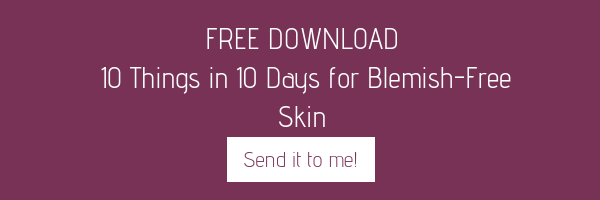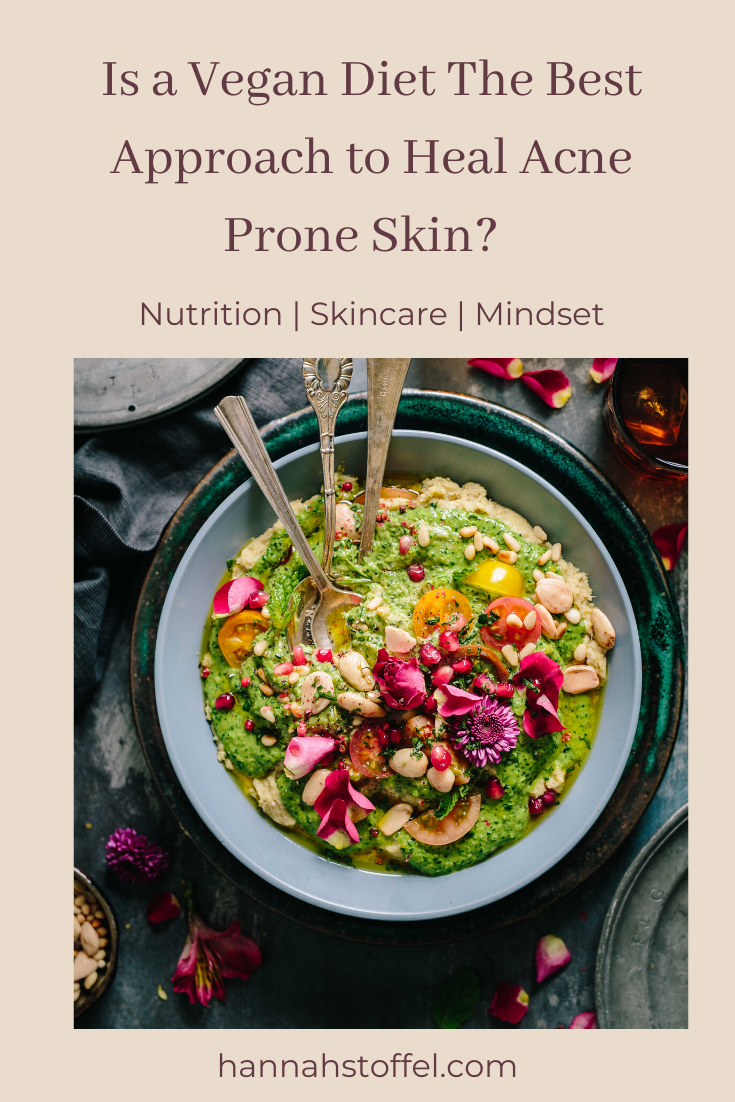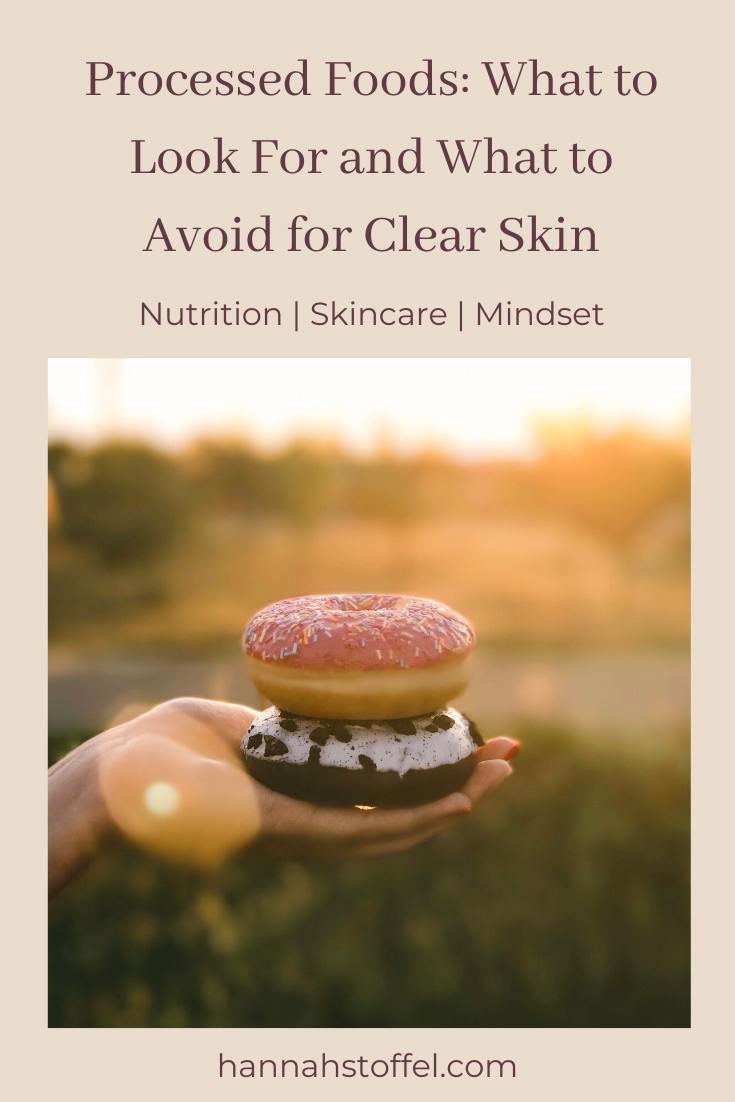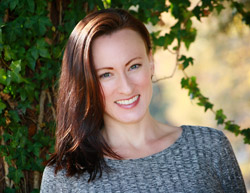
While the cystic acne on my face was at it's height in severity, I went vegan for many months. In the beginning I did notice some improvement in the appearance of my skin. However, in the end being vegan didn't win out for me.
While my diet is still largely plant based, I don't eliminate all animal products. I want to share with you my thoughts on the vegan diet, specifically as it relates to acne.

The benefits of a vegan diet can be the large number of plants consumed. When you're not consuming animal protein, you need more fruits and vegetables to fill you up. Fruits and vegetables contain antioxidants which help fight inflammation in the body.
Acne can be an indication of excess inflammation in the body so, logically, it makes sense to consume more fruits and vegetables. The problem that often arises here, and the reason I put can be in italics, it's easy to be vegan and lose sight of nutrition.
It's easy to become so focused on whether a not a food is vegan that you forget to evaluate nutritional value. Technically, Oreo's® are vegan. Although I don't think anyone would argue that eating these cookies will help clear your skin. I've seen many times, including in myself, where consuming a vegan diet quickly turns to lots of vegan baked goods, pastas and baked potatoes. These things are fine in moderation but they aren't the super-foods needed to boost our immune system so you can give acne a kiss good-bye.
The downside to a vegan diet is its neglect of healthy fats. When researching a vegan diet I was quite alarmed at how many proponents of this diet still had the low fat mentality that plagued the 90's. The concept of following a low fat/no fat diet is outdated information that was never actually correct. In fact, during the 90's when the low fat craze really took off, heart disease increased as people's waist lines grew. Why did this happen? Most likely it was due to high insulin levels. Instead of eating healthy fats, which keep you fuller, longer, people were eating low- fat crackers, highly refined pastas and low- fat yogurts. All these things spike our insulin levels which leads to excess belly fat, AND many people felt constantly hungry because the very thing that helps keep us full fat was removed from food. What I'm discussing here pertains to weight gain and heart health but, please make no mistake, it's also connected to the appearance of your skin. Warning signs of internal excess inflammation in the body, such as acne, should help us connect the dots: a low-fat/no fat diet won't give us the skin, or the overall health we want.
Vegan diets also eliminate the intake of wild-caught, sockeye salmon. I really can't overstate its benefits to our skin health. First, wild-caught salmon provides a hefty dose of omega-3 essential fatty acids. Essential fatty acids simply means our bodies don't make these fats, therefore, we must get them from food. Omega-6's are also essential fatty acids. However, because of deficiencies in our food supply these days (such as eating grain-fed instead of grass-fed beef, or consuming processed foods containing unhealthy, shelf-stable oils) we are ingesting too much omega-6's and not enough omega-3's. The ratio of these oils should be 1:2 omega 3 omega 6. Unfortunately, our modern diets tend to have a ratio of 1:10 of omega-3 (anti-inflammatory) to omega-6 (inflammatory). [William Sears, MD, The Inflammation Solution,©2015]
Vegan diets also lack astaxanthin. Here we go again with salmon the prize winning fish! Astaxanthin is another reason to love this fish. Astaxanthin gives salmon its beautiful pink color. It's a nutrient that has a powerful anti-inflammatory effect. Astaxanthin paired with beneficial omega-3's in wild-caught salmon make this fish vital to our diets. Notice I keep emphasizing wild-caught. It is important that you avoid purchasing farm-raised salmon. It doesn't contain the same amounts of the powerful antioxidants. In fact, farm-raised salmon may have pink color added, so it appears more like wild-caught. I also take a fish oil supplement and have noticed a difference in my skin, hair and nails.
Tip: On the days you enjoy salmon for dinner it's okay to skip your fish oil supplement. This will help you stretch your budget a bit farther as well!
Lastly, I encourage you not to place yourself in a "diet camp." What I mean specifically is avoid anything that promises weight loss as its single goal. It can lead to an all or nothing mentality, in which you feel guilty if you are ever in a situation that makes it impossible to eat and still stay within the diet's strict guidelines. What I do encourage, instead, is focus on real, whole-food nutrition. Shop the perimeter of your grocery store. Opt for organic produce and meats when possible. If unavoidable, be very selective in the purchase of processed foods. If you're curious what to look for when purchasing processed foods, you can read more here.

Have you ever tried, or are you currently following a vegan diet? Have you noticed an improvement in your skin, hair, and nails? How are you currently eating, and how does it make you feel? Please comment!





